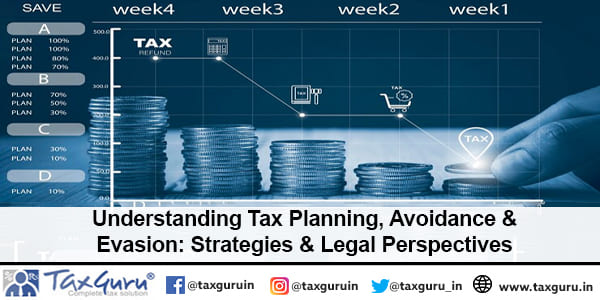Introduction
Navigating the complex world of taxes is a daunting task for individuals and corporations alike. With the ever-evolving tax laws and regulations, understanding the nuances of tax planning, avoidance, and evasion becomes crucial. This blog post delves into the fine lines that differentiate these practices, backed by legal perspectives and notable case laws. Prepare to embark on a journey through the realms of tax strategies, their implications, and the legal frameworks governing them.
The Essence of Tax Planning, Avoidance, and Evasion
Tax planning is an essential aspect of financial planning, allowing individuals and businesses to minimize their tax liabilities legally. It involves leveraging tax laws to one’s advantage, ensuring all deductions, exemptions, and credits are utilized effectively. On the flip side, tax avoidance and evasion are practices that often stir debate within the financial and legal communities.
Tax Avoidance, though legal, involves bending the rules of the tax system to one’s benefit without breaking the law. It’s a practice that operates in the grey area, often scrutinized by tax authorities for its ethical implications.
Tax Evasion is outright illegal. It involves concealing income, inflating deductions, or not reporting cash transactions, among other deceitful practices, to reduce tax liability.
Legal Perspectives and Case Laws
The legal system plays a pivotal role in distinguishing between these practices. The landmark judgment in the case of M/s. McDowell and Co. Ltd. vs. Commercial Tax Officer set a precedent, emphasizing that tax planning must be within the framework of law. The verdict highlighted the importance of distinguishing between legitimate tax planning and practices that verge on avoidance or evasion.
Further, the introduction of General Anti-Avoidance Rules (GAAR) marked a significant shift in how tax avoidance schemes are perceived and handled legally. GAAR aims to curb aggressive tax planning strategies that lack commercial substance, essentially blurring the lines between tax avoidance and evasion.

Navigating the Thin Line
The distinction between tax planning, avoidance, and evasion is nuanced and subject to legal interpretation. Tax planning is encouraged, provided it adheres to the letter and spirit of the law. Tax avoidance, while not illegal, may attract scrutiny if it’s perceived as exploiting loopholes in the tax system. Evasion, being unlawful, carries significant penalties and legal repercussions.
Conclusion: The Road Ahead
As tax laws continue to evolve, so does the interpretation of tax planning, avoidance, and evasion. It’s imperative for taxpayers to stay informed and seek professional advice when navigating these complex waters. Remember, while optimizing tax liabilities is prudent financial planning, crossing into the realm of avoidance or evasion can lead to legal challenges.
FAQs
1. What is tax planning and why is it important?
Tax planning is the legal process of arranging your financial affairs to minimize your tax liability within the bounds of the law. It’s important because it helps individuals and businesses save money, ensuring they pay the least amount of taxes required by law while remaining compliant with tax regulations.
2. How does tax avoidance differ from tax planning?
While tax planning is a legal way to reduce tax liability, tax avoidance involves bending the tax rules to gain tax advantages without outright breaking the law. It often exploits loopholes or grey areas in tax legislation.
3. What constitutes tax evasion, and what are its consequences?
Tax evasion is an illegal practice where an individual or entity deliberately misrepresents or conceals information to reduce tax liability. This includes underreporting income, inflating deductions, or hiding money in offshore accounts. The consequences can range from fines and penalties to imprisonment.
4. Can tax planning result in tax evasion accidentally?
If not carefully managed, aggressive tax planning strategies can cross the line into tax evasion, especially if they involve deceitful practices like underreporting income. It’s crucial to consult tax professionals to ensure that tax planning strategies are both effective and legal.
5. What role do General Anti-Avoidance Rules (GAAR) play in tax planning?
GAAR provisions aim to curb aggressive tax planning strategies that lack commercial substance, essentially targeting schemes designed primarily for obtaining tax benefits in ways not intended by the law. GAAR helps in distinguishing between acceptable tax planning and unacceptable tax avoidance practices.
6. How can taxpayers ensure their tax planning strategies do not fall under tax avoidance or evasion?
Taxpayers should seek advice from reputable tax professionals, stay informed about tax laws and regulations, and ensure their tax planning strategies have legitimate business purposes and commercial substance beyond just tax savings.
7. What is the significance of the McDowell case in understanding tax avoidance and evasion?
The McDowell case is a landmark judgment that highlighted the ethical and legal boundaries of tax planning. It emphasized that while tax planning is legal, schemes that appear to be artificial or designed to circumvent tax laws could be deemed unacceptable, setting a precedent for evaluating tax avoidance practices.
8. What does “lack of commercial substance” mean in the context of tax avoidance?
A transaction or series of transactions lack commercial substance if they do not result in a significant change in the taxpayer’s economic position (except for the tax benefits) or if they involve circular transactions with no real economic purpose other than to gain tax advantages.
9. Are there specific examples of tax evasion practices taxpayers should avoid?
Examples include misrepresenting income, failing to report cash transactions, inflating expenses or deductions, and using offshore accounts to hide assets. Engaging in these practices can lead to severe legal penalties.
10. How do tax authorities identify potential tax avoidance or evasion?
Tax authorities use various tools and strategies, including analyzing discrepancies in tax returns, conducting audits, and reviewing transactions that lack commercial substance. The introduction of GAAR also provides a legal framework to assess and address aggressive tax planning strategies.
These FAQs provide a foundational understanding of tax planning, avoidance, and evasion, incorporating insights from above article help to clarify the legal and ethical standards involved in managing tax liabilities.
*****
This article is not served as professional advice. You may not rely on the opinion expressed in this article to make a business or regulatory compliance-related decision. If you are looking for professional advice, please consult a professional. Any comments and/or suggestions concerning this article may be sent to dipak_fca@yahoo.in for any query feel free to whatsapp at +91 8000777854





